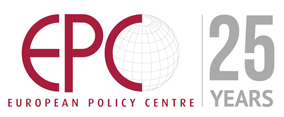(8 February, 2024 – EPC)
Speakers:
- Aaron David Miller, Senior Fellow, Carnegie Endowment for International Peace;
- Adnan Tabatabai, CEO, Center for Applied Research in Partnership with Orient (CARPO);
- Andrea Dessì, Assistant Professor, American University of Rome & Scientific Advisor, Istituto Affari Internazionali (IAI);
- Maya Sion-Tzidkiyahu, Director of the Israel-Europe Relations Program, Mitvim.
Moderator:
- Mihai Chihaia, Policy Analyst, European Policy Centre.
Mr. Miller emphasized the entrenched positions of Israel and Hamas, suggesting that external efforts, including those of the Biden administration, have limited influence. He has underscored two important opinions: first, that “Israel’s current prime minister is not prepared to make the kinds of concessions that would lead to a quick and comprehensive de-escalation cessation of hostilities.” and that “Hamas continues to believe that it can get more by deploying the two or three assets that seems to have, that it’s played to its advantage.”
He also highlighted Hamas’ reliance on tunnel infrastructure, hostage negotiations, and time as strategic assets, questioning the efficacy of Israeli military objectives in weakening Hamas. He also expressed skepticism about the feasibility of a comprehensive regional solution, given the challenges within the Israeli government and the complex political landscape. He pointed out the salient fact that the Israel-Hamas war is currently in its fifth month, with questionable results.
Maya Sion-Tzidkiyahu has criticized Netanyahu’s government for rejecting the two-state solution and failing to address governance in Gaza. She has drawn the attention of the audience to the internal disagreements within the Israeli government regarding military objectives and the lack of focus on post-conflict planning. She has also highlighted the tension surrounding hostage negotiation and the government’s stance on UNRWA aid in Gaza.
Andrea Dessì has acknowledged Israel’s dominant role in the conflict but underscored the involvement of various international actors. He has criticized the European Union’s limited influence in the Israeli-Palestinian conflict and highlighted internal divisions within the EU regarding its response to the crisis. At the same time, he noted a shift in the EU’s rhetoric as a result of the effects of Israeli military actions and emphasized the need for a more comprehensive approach.
Adnan Tabatabai has emphasized the interconnected nature of conflicts in the Middle East and the gradual regionalization of the Gaza crisis. As a result of this, he criticized the lack of a comprehensive approach in addressing the conflict and called for engagement with all parties, including those deemed somewhat “unfavorable”. He added the importance of understanding the motivations and dynamics of the region’s various non-state actors, urging policymakers to adopt a pragmatic approach to the resolution of the conflict.
The speakers have all agreed that the conflict is very complex, as there are a variety of factors behind it (which is well-known to everybody), not only historical reasons, but geopolitical dynamics, and most of all, internal politics. There is fear of the conflict growing regional, which currently is more of a possibility, not a reality. The exacerbating tensions in the region complicates the efforts towards de-escalation. All the speakers mentioned the need for a comprehensive approach, the real reasons behind this conflict are important, to find out which are the stakeholders, including non-state actors that are involved. They highlighted the necessity of handling this complex conflict with sensitivity.
Link to the video recording of the event:
https://epc.eu/en/past-events/The-IsraelHamas-war-Local-and-regional~57ab5c

